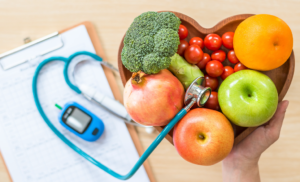Observing Nutrition and Colorectal Cancer Awareness Month
Recognizing the importance of healthy eating.
March is designated as National Nutrition Month by the Academy of Nutrition and Dietetics. Furthermore, it is also observed as Colorectal Cancer Awareness Month. Given the significance of these topics, in this article we’ll explore how adopting healthy eating habits can be instrumental in preventing diseases, particularly colon and rectal cancer.

Healthy Eating
Maintaining a healthy diet should be part of our lifestyle. The reality is that when we have a busy life, maintaining a balanced diet can be a challenge. However, here we will mention some practical tips for better eating and overcoming the challenges of daily life. When you have a healthy diet, you prevent diseases and even delay health problems and aging. In fact, recent studies suggest that certain foods may be related to a higher risk of developing colorectal cancer. So, it is of utmost importance to evaluate our eating habits.
Tips for Healthy Eating
- Establish a weekly meal plan. Think ahead and plan where you will eat or bring your own prepared meals.
- Take time to evaluate the menu before ordering.
- Check the nutritional information, specifically noting the calorie content.
- Order smaller portions, appetizers or a meal from the kids’ menu instead of a main dish.
- Share regular-sized dishes, thereby reducing the amount you consume.
- Have healthy snacks available.
- Consult with a nutritionist and evaluate your eating habits. Discuss with your nutritionist and doctors what the appropriate nutritional recommendations would be for your age, sex, health status, and amount of physical activity you do per day.
Nutrition and Colorectal Cancer
According to Fight Colorectal Cancer, colorectal cancer is the second leading cause of cancer death among men and women combined in the United States. It is estimated that 1 in 23 men and 1 in 26 women will be diagnosed with this type of cancer. Furthermore, although there is no specific diet to prevent colorectal cancer, the most recent studies have shown that diet can be a protective factor in preventing it. Outlined below are some nutritional tips to reduce chronic inflammation of the intestine and decrease the risk of colon and rectal cancer.
Increase consumption of:
- Fiber: 30 grams of fiber should be consumed per day (foods such as whole grains, rice, nuts, and legumes are excellent sources of fiber).
- Fruits and vegetables: 5 servings of fresh fruits and vegetables should be consumed daily.
- Dairy: 2 servings of dairy should be consumed per day (yogurt, milk, cheese, or substitutes).
Decrease consumption of:
- Red meats: Reduce red meat consumption to 18 ounces per week or less.
- Processed meats: Avoid highly processed meats, cold cuts, and canned meats.
- Sugary beverages: Limit sugary drinks like sodas and artificial juices.
- Alcoholic beverages: Avoid alcohol consumption, as it has been shown to increase the risk of cancer.
Make this month count by initiating your action plan to embrace a healthier diet!

